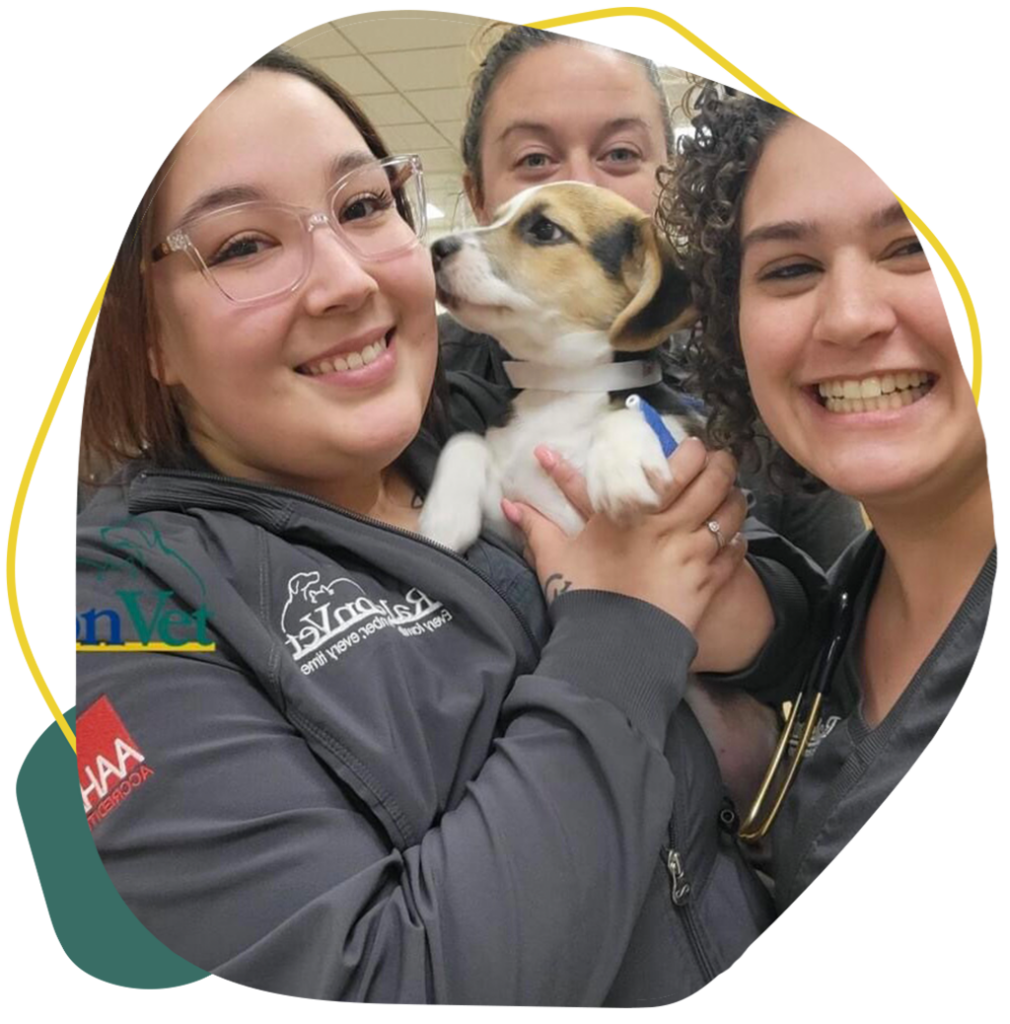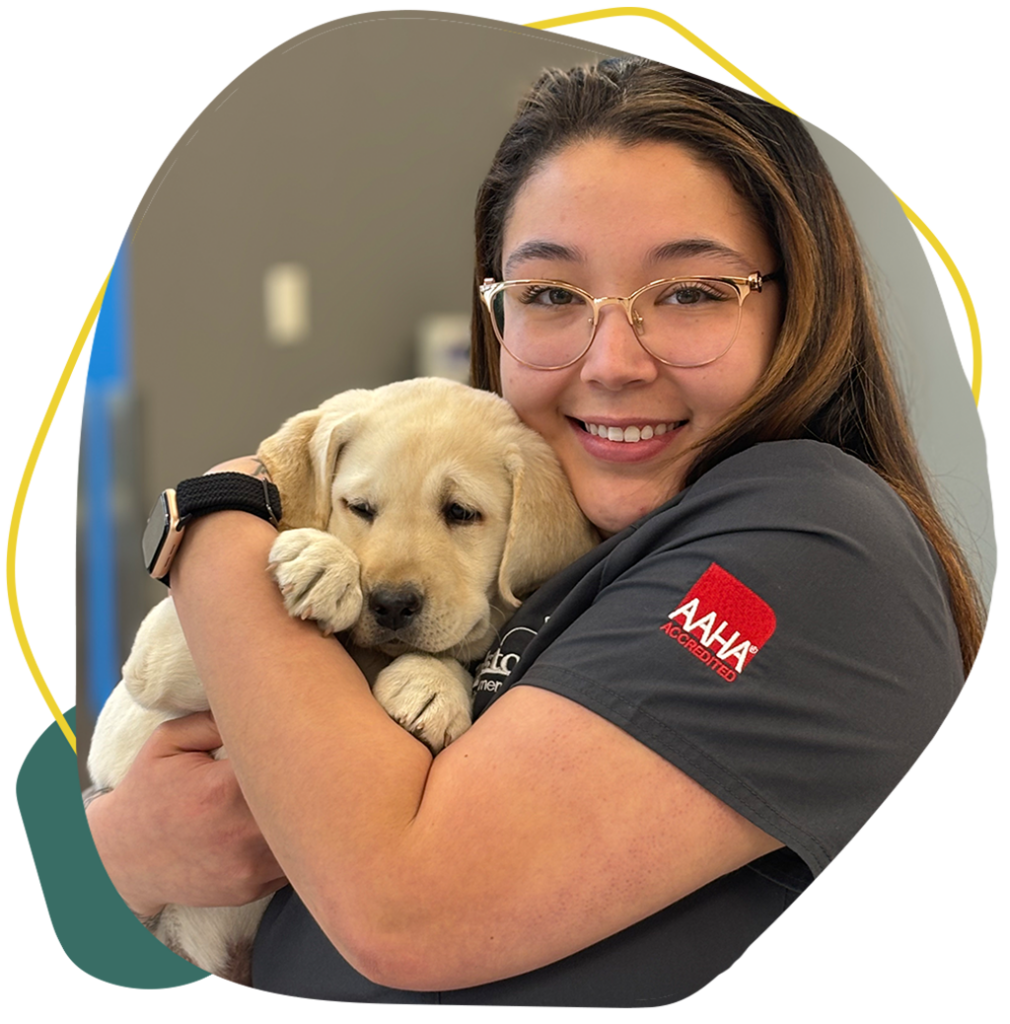Rabies
A fatal virus causing severe neurological damage & is transmittable to humans. The vaccine is required by the state of Nebraska for the safety of pets & humans.


Vaccinations are vital for preventing serious diseases in your puppy. Even if your dog stays indoors, they can be exposed to viruses carried in the air, dust, or on clothing. Vaccinating is the best way to protect your new puppy from potentially life-threatening illnesses that can be costly to treat. The first series of core vaccines begins around 6 weeks of age, with boosters given every 3-4 weeks until your puppy is fully vaccinated. This process helps build antibodies in the blood, providing protection against infections. Once fully vaccinated, yearly exams & vaccine boosters are necessary to keep your dog protected & healthy for life.
A fatal virus causing severe neurological damage & is transmittable to humans. The vaccine is required by the state of Nebraska for the safety of pets & humans.
A virus leading to systemic illness, seizures, respiratory issues, &
possibly death.
A respiratory virus spread through coughing & sneezing, leading to infections ranging from rhinitis to pneumonia.
Also known as Infectious Hepatitis, this virus causes severe systemic
disease.
Affects rapidly dividing cells, leading to fever, vomiting, & possibly death.
A bacterial disease affecting kidneys & liver, transmittable to humans through contaminated water sources.
Commonly known as kennel cough, this bacterial infection causes upper
respiratory issues & is spread through coughing & sneezing. Recommended for dogs
frequently exposed to other pets.
We recommend keeping your dog’s annual exams & vaccines on schedule once their puppy boosters are complete to support a long & happy life!
Both indoor & outdoor dogs are at risk for heartworm infection, which is spread by mosquitoes. Year-round prevention is recommended, as even a small number of adult worms can cause severe disease. Testing is performed annually for all dogs over 6 months of age.
Fleas & ticks can carry many infectious diseases that cause illness in your puppy. Year-round preventive care is recommended. Our team & doctors will help you choose the best prevention option for your family.
Spaying involves the surgical removal of the ovaries & uterus, preventing
pregnancy, heat cycles, & behavioral changes. It’s recommended between 6-18 months of age, depending on the size & breed of your puppy. Spaying also reduces the risk of mammary cancer & uterine infections as your dog ages.
Neutering involves the surgical removal of the testicles, reducing the risk of
testicular cancer & certain prostatic problems. It may also help discourage aggression, hyperactivity, marking, roaming, & fighting. Neutering is recommended after 6 months of age, depending on breed & size.


If you have any questions or concerns, please don’t hesitate to contact us. We’re here to support you & your new puppy every step of the way. Feel free to explore more information on our site to ensure your pet receives the best care possible.
It’s important to discourage unwanted behaviors early to prevent them from
becoming lifelong habits.
Consider your puppy’s size, energy levels, grooming needs, & medical predispositions. Understanding these will help you care for your puppy throughout their life.
Restraint & touch desensitization exercises are recommended to make grooming, bathing, & vet visits less stressful. Practice gentle restraint & touch desensitization early on to alleviate anxiety during routine care.
Consistency is key. Alternate free time with confinement to teach your puppy where & when to relieve themselves. Be patient & avoid harsh corrections if accidents occur.
Starting an oral hygiene routine early is crucial for your puppy’s overall health. Begin by getting your puppy comfortable with you looking in their mouth & gently rubbing their gums. Gradually introduce a soft bristle brush or finger brush with dog-specific toothpaste.
If you’d like a tooth brushing demonstration, any of our Licensed Veterinary Technicians will be glad to assist you!